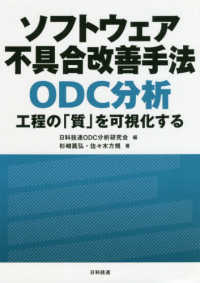- ホーム
- > 洋書
- > ドイツ書
- > Social Sciences, Jurisprudence & Economy
- > Politics, Society, Work
- > general surveys & lexicons
Full Description
According to Habermas, the contemporary public sphere is post-secular. In other words, the continuing presence of religious communities within a secular society is indisputable. However, the significance of this is not entirely clear, despite intensive discussion by social scientists, journalists, policymakers and politicians regarding the role of religion in the public sphere. Understanding contemporary religious phenomena requires serious academic and public engagement.
Drawing on theoretical approaches from sociology (Max Weber), philosophy (John Rawls) and religious studies (Abdulkader Tayob), this book analyses empirical data from the study of a madrasa in South Africa in order to explore the important question of how individuals may engage in the public sphere as members of religious communities.
Contents
Contents: Comprehending the public sphere - Doctrine in a religious ethic - Doctrine in Islamic education - Madrasa Warda: An association of the Deobandi education movement - A lesson in perfecting character - Religious ethic as comprehensive doctrine: Engaging in the post-secular public sphere.








